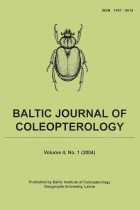Multivariate analysis of a long-term study on carabid beetles (Coleoptera: Carabidae) on a colliery spoil heap in the Ruhr Valley Area
Main Article Content
Keywords
:
Carabidae, colliery spoil heap, succession, multivariate analysis, recultivation
Abstract
Carabid beetles were collected in the course of a long-term study on an experimental colliery spoil heap in the Ruhr Valley Area from 1989 till 2000. Sampling was carried out on an old part planted with birch trees, new parts being used for scientific studies on the reclamation of colliery spoil, and in the surrounding of the heap. The data were analysed using multivariate statistical methods (CANOCO, TWINSPAN). The results indicate that on colliery spoil changes in the carabid communities are rather stochastic and not a result of succession, whereas at a study site not established on colliery spoil a succession could be demonstrated. The majority of the carabid species on the colliery spoil heap are supposed to reproduce on this area. They build communities which are now stable for about twelve years. It is discussed whether the reclamation of colliery spoil based on the method of natural succession may result in improved soil conditions and stimulate successional processes of carabid fauna.
Article Details
Statistics
Downloads
Download data is not yet available.
Recommend Articles
